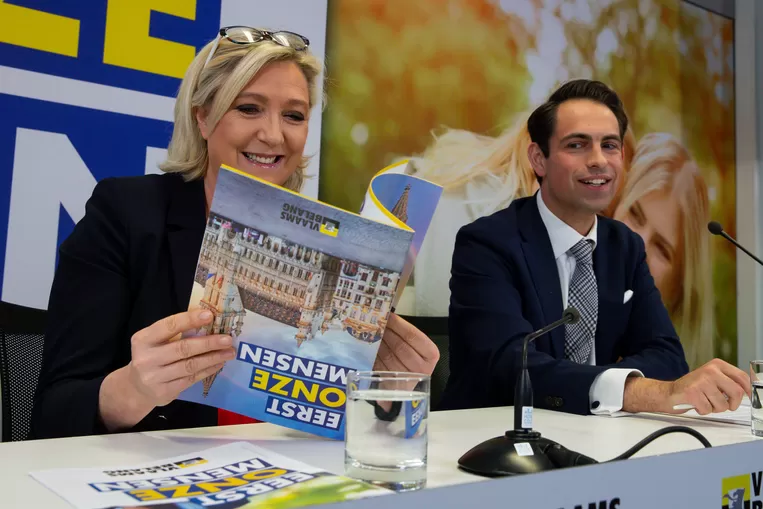Another showdown looms between Emmanuel Macron and Marine Le Pen, as anti-establishment parties continue to rise in France, helped by the collapse of traditional parties such as the Socialist Party (PS) and the Republicans (LR).
Although centrist Emmanuel Macron took almost 30% of the vote in the first round, his most forceful opponents were far-right challenger Le Pen with 23% of the vote and far-left candidate Jean-Luc Melenchon with 22% of the vote.
Macron is no longer the fresh-faced candidate that he was in 2017 and has to defend his party programme for the last five years. As a veteran of French politics but ultimately untested in a position of power, Le Pen can still make sweeping campaign promises, which would have a wide-ranging impact for France domestically, but would also have implications for the EU.
Gridlocked France
Were Le Pen to become president, political analyst Julien Hoez thinks it could lead to a "complete gridlock" due to the legislative election coming up in France later this year.
"A lot of people are going to hunker down, make alliances and do everything they can to keep the Rassemblement National out of the parliament," Hoez said.
In this case, Le Pen may try to force policies through by executive order, as Trump did in the United States. However, it would be unusual for France as the president's party usually gets some kind of majority in the legislative elections.
Even more unusual is the attitude taken by the French Civil Service, Hoez says. "People outside France tend not to understand the power of the Civil Service, who would frustrate the agenda of a far-right president as much as possible by delaying legislative action and delaying motions."
EU implications
Since Brexit, the calls for 'Frexit' have been toned down, but a Le Pen presidency could mark a new wave of Euroscepticism.
She told Le Parisien in 2017 that she would tear apart France's relationship with the EU "to give back to the French people their sovereignty". A France with Le Pen at the helm would have a less global and more protectionist economic outlook. She has also voiced scepticism about France's continuing to use the Euro currency.
Le Pen has also proposed pulling France out of NATO's joint military command to beef up French sovereignty. As the EU's only nuclear power and seat on the UN Security Council, an isolationist France could spell trouble for EU defence capabilities.
Related News
- French election update: the rise of Le Pen
- French people rush to vote at Brussels Expo, creating traffic jams near Heysel
- French elections: Macron to face off far-right challenger Le Pen
Furthermore, despite distancing herself from Russian President Vladimir Putin in recent weeks, Le Pen's party owes €8 million to a Russian bank with ties to the Kremlin. Her close ties to Russia could make it difficult for Europe to act in unity.
France flirts with the far-right
The rise of the far-right can partly be explained by what has happened to France's traditional political parties. The conservative candidate for Les Républicains Valérie Pécresse secured just under 5% of the vote. Led by Anne Hidalgo, the socialists (PS) did even worse winning under 2% of the vote. Both political parties now face financial troubles as 5% of the vote is needed to secure campaign reimbursements.
"I don't think it's necessarily resurgence, because they've always been there," said Hoez on the rise of the far-right. "But it's been more made more explicit by the inherent weakness of the right-wing," he noted.
Hoez explained that France's right-wing has gone through a crisis because moderates such as Édouard Philippe left to join a coalition with En Marche (Emmanuel Macron's party). That meant that "puritanical right-wingers" were left to follow the Gaullist tradition, as well as more extreme members on the right like Eric Zemmour, according to Hoez.
But France's left has been in decline too. "Macron's election basically crippled the Socialist Party, because he took a bunch of the heavy hitters with him," said Hoez.
With the traditional left and right in tatters, voters have flocked to the extremes of the political spectrum or voted for Macron in the centre. It remains to be seen which vision for France voters will opt for in the second round of the French election on 24 April.

